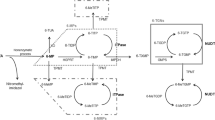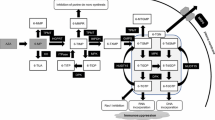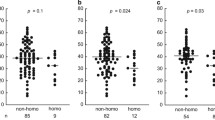Abstract
Background
Multidrug resistance protein 4 (MRP4) functions as an efflux pump of nucleoside monophosphate analogs, such as 6-mercaptopurine (6-MP) and 6-thioguanine nucleotide (6-TGN). A single-nucleotide polymorphism in human MRP4 (rs3765534) dramatically reduces MRP4 function and results in the intracellular accumulation of 6-TGN. In this study, we investigated the association between MRP4 G2269A polymorphism and thiopurine sensitivity in Japanese IBD patients.
Methods
Direct sequencing of the MRP4 exon 18 was performed. The TPMT A719G and ITPase C94A polymorphisms were determined by polymerase-chain reaction-restriction fragment length polymorphism analyses.
Results
Of the 279 samples analyzed (44 healthy volunteers and 235 IBD patients), 68 samples showed a heterozygote of MRP4 G2269A and 7 carried a homozygote. The allelic frequency of MRP4 G2269A was 14.7%. In 130 IBD patients treated with azathioprine/6-MP, the white blood cell count was significantly lower in patients with the MRP4 variant alone (n = 26) than in patients with a wild allelotype (n = 74) (P = 0.014) or in patients with the ITPase variant alone (n = 22) (P = 0.0095). The 6-TGN levels were significantly higher in patients with the MRP4 variant alone than in patients with the wild allelotype (P = 0.049). Of the 15 patients who experienced leucopenia (<3 × 109/l), 7 patients carried the MRP4 variant. The odds ratio of carrying the MRP4 variant alone and having leukopenia was 3.30 (95% confidence interval 1.03–10.57, P = 0.036).
Conclusions
These results suggest that MRP4 G2269A might be a new factor accounting for thiopurine sensitivity in Japanese patients with IBD.



Similar content being viewed by others
References
Adler DJ, Korelitz BI. The therapeutic efficacy of 6-mercaptopurine in refractory ulcerative colitis. Am J Gastroenterol. 1990;85:717–22.
Sandborn W, Sutherland L, Pearson D, May G, Modigliani R, Prantera C. Azathioprine or 6-mercaptopurine for inducing remission of Crohn’s disease. Cochrane Database Syst Rev. 2000:CD000545.
Hibi T, Ogata H. Novel pathophysiological concepts of inflammatory bowel disease. J Gastroenterol. 2006;41:10–6.
Gearry RB, Barclay ML, Burt MJ, Collett JA, Chapman BA. Thiopurine drug adverse effects in a population of New Zealand patients with inflammatory bowel disease. Pharmacoepidemiol Drug Saf. 2004;13:563–7.
Van Dieren JM, Hansen BE, Kuipers EJ, Nieuwenhuis EE, Van der Woude CJ. Meta-analysis: Inosine triphosphate pyrophosphatase polymorphisms and thiopurine toxicity in the treatment of inflammatory bowel disease. Aliment Pharmacol Ther. 2007;26:643–52.
Gisbert JP, Gomollon F. Thiopurine-induced myelotoxicity in patients with inflammatory bowel disease: a review. Am J Gastroenterol. 2008;103:1783–800.
Takatsu N, Matsui T, Murakami Y, Ishihara H, Hisabe T, Nagahama T, et al. Adverse reactions to azathioprine cannot be predicted by thiopurine S-methyltransferase genotype in Japanese patients with inflammatory bowel disease. J Gastroenterol Hepatol. 2009;24:1258–64.
Lees CW, Maan AK, Hansoti B, Satsangi J, Arnott ID. Tolerability and safety of mercaptopurine in azathioprine-intolerant patients with inflammatory bowel disease. Aliment Pharmacol Ther. 2008;27:220–7.
Winter JW, Gaffney D, Shapiro D, Spooner RJ, Marinaki AM, Sanderson JD, et al. Assessment of thiopurine methyltransferase enzyme activity is superior to genotype in predicting myelosuppression following azathioprine therapy in patients with inflammatory bowel disease. Aliment Pharmacol Ther. 2007;25:1069–77.
Lichtenstein GR, Sbreu MT, Cohen R, Tremaine W. American Gastroenterological Association Institute technical review on corticosteroids, immunomodulators, and infliximab in inflammatory bowel disease. Rev Gastroenterol Mex. 2006;71:351–401.
Hibi T, Naganuma M, Kitahora T, Kinjyo F, Shimoyama T. Low-dose azathioprine is effective and safe for maintenance of remission in patients with ulcerative colitis. J Gastroenterol. 2003;38:740–6.
Derijks LJ, Gilissen LP, Engels LG, Bos LP, Bus PJ, Lohman JJ, et al. Pharmacokinetics of 6-thioguanine in patients with inflammatory bowel disease. Ther Drug Monit. 2006;28:45–50.
Haglund S, Taipalensuu J, Peterson C, Almer S. IMPDH activity in thiopurine-treated patients with inflammatory bowel disease—relation to TPMT activity and metabolite concentrations. Br J Clin Pharmacol. 2008;65(1):69–77.
Hiratsuka M, Inoue T, Omori F, Agatsuma Y, Mizugaki M. Genetic analysis of thiopurine methyltransferase polymorphism in a Japanese population. Mutat Res. 2000;448:91–5.
Ban H, Andoh A, Tanaka A, Tsujikawa T, Sasaki M, Saito Y, et al. Analysis of thiopurine S-methyltransferase genotypes in Japanese patients with inflammatory bowel disease. Intern Med. 2008;47:1645–8.
Uchiyama K, Nakamura M, Kubota T, Yamane T, Fujise K, Tajiri H. Thiopurine S-methyltransferase and inosine triphosphate pyrophosphohydrolase genes in Japanese patients with inflammatory bowel disease in whom adverse drug reactions were induced by azathioprine/6-mercaptopurine treatment. J Gastroenterol. 2009;44:197–203.
Kurzawski M, Dziewanowski K, Lener A, Drozdzik M. TPMT but not ITPA gene polymorphism influences the risk of azathioprine intolerance in renal transplant recipients. Eur J Clin Pharmacol. 2009;65:533–40.
Allorge D, Hamdan R, Broly F, Libersa C, Colombel JF. ITPA genotyping test does not improve detection of Crohn’s disease patients at risk of azathioprine/6-mercaptopurine induced myelosuppression. Gut. 2005;54:565.
Zelinkova Z, Derijks LJ, Stokkers PC, Vogels EW, van Kampen AH, Curvers WL, et al. Inosine triphosphate pyrophosphatase and thiopurine S-methyltransferase genotypes relationship to azathioprine-induced myelosuppression. Clin Gastroenterol Hepatol. 2006;4:44–9.
Wielinga PR, Reid G, Challa EE, van der Heijden I, van Deemter L, de Haas M, et al. Thiopurine metabolism and identification of the thiopurine metabolites transported by MRP4 and MRP5 overexpressed in human embryonic kidney cells. Mol Pharmacol. 2002;62:1321–31.
Krishnamurthy P, Schwab M, Takenaka K, Nachagari D, Morgan J, Leslie M, et al. Transporter-mediated protection against thiopurine-induced hematopoietic toxicity. Cancer Res. 2008;68:4983–9.
Peng XX, Shi Z, Damaraju VL, Huang XC, Kruh GD, Wu HC, et al. Up-regulation of MRP4 and down-regulation of influx transporters in human leukemic cells with acquired resistance to 6-mercaptopurine. Leuk Res. 2008;32:799–809.
Borst P, Evers R, Kool M, Wijnholds J. A family of drug transporters: the multidrug resistance-associated proteins. J Natl Cancer Inst. 2000;92:1295–302.
Turriziani O, Gianotti N, Falasca F, Boni A, Vestri AR, Zoccoli A, et al. Expression levels of MDR1, MRP1, MRP4, and MRP5 in peripheral blood mononuclear cells from HIV infected patients failing antiretroviral therapy. J Med Virol. 2008;80:766–71.
Oevermann L, Scheitz J, Starke K, Kock K, Kiefer T, Dolken G, et al. Hematopoietic stem cell differentiation affects expression and function of MRP4 (ABCC4), a transport protein for signaling molecules and drugs. Int J Cancer. 2009;124:2303–11.
Chen ZS, Lee K, Kruh GD. Transport of cyclic nucleotides and estradiol 17-beta-d-glucuronide by multidrug resistance protein 4. Resistance to 6-mercaptopurine and 6-thioguanine. J Biol Chem. 2001;276:33747–54.
Yates CR, Krynetski EY, Loennechen T, Fessing MY, Tai HL, Pui CH, et al. Molecular diagnosis of thiopurine S-methyltransferase deficiency: genetic basis for azathioprine and mercaptopurine intolerance. Ann Intern Med. 1997;126:608–14.
Marinaki AM, Ansari A, Duley JA, Arenas M, Sumi S, Lewis CM, et al. Adverse drug reactions to azathioprine therapy are associated with polymorphism in the gene encoding inosine triphosphate pyrophosphatase (ITPase). Pharmacogenetics. 2004;14:181–7.
Pike MG, Franklin CL, Mays DC, Lipsky JJ, Lowry PW, Sandborn WJ. Improved methods for determining the concentration of 6-thioguanine nucleotides and 6-methylmercaptopurine nucleotides in blood. J Chromatogr B Biomed Sci Appl. 2001;757:1–9.
Andoh A, Tsujikawa T, Ban H, Hashimoto T, Bamba S, Ogawa A, et al. Monitoring 6-thioguanine nucleotide concentrations in Japanese patients with inflammatory bowel disease. J Gastroenterol Hepatol. 2008;23:1373–7.
Author information
Authors and Affiliations
Corresponding author
Rights and permissions
About this article
Cite this article
Ban, H., Andoh, A., Imaeda, H. et al. The multidrug-resistance protein 4 polymorphism is a new factor accounting for thiopurine sensitivity in Japanese patients with inflammatory bowel disease. J Gastroenterol 45, 1014–1021 (2010). https://doi.org/10.1007/s00535-010-0248-y
Received:
Accepted:
Published:
Issue Date:
DOI: https://doi.org/10.1007/s00535-010-0248-y




